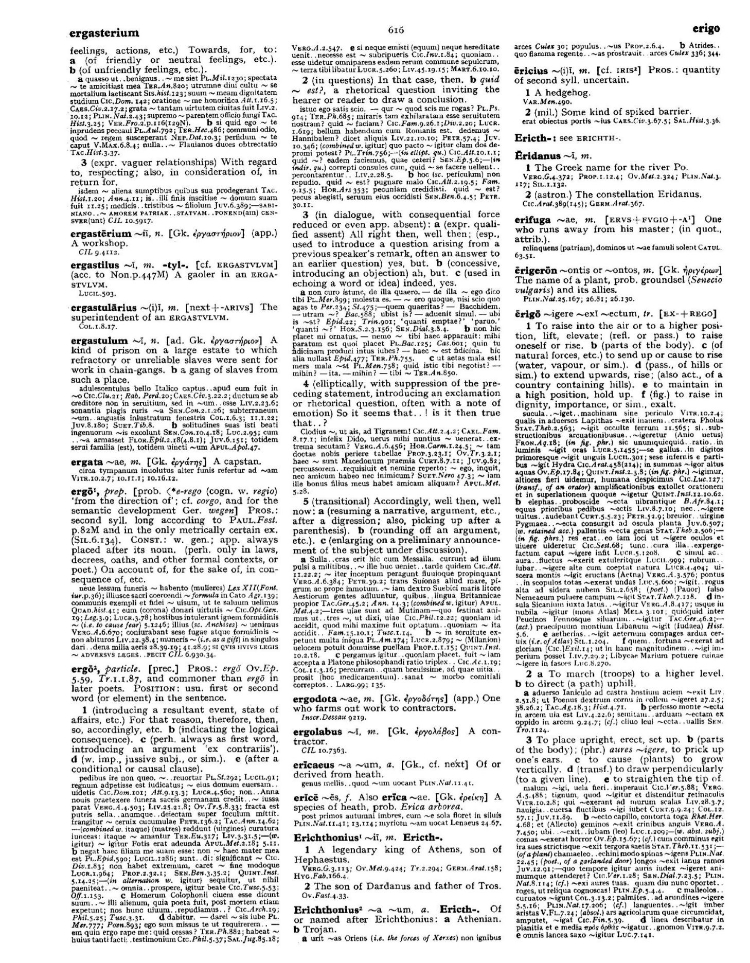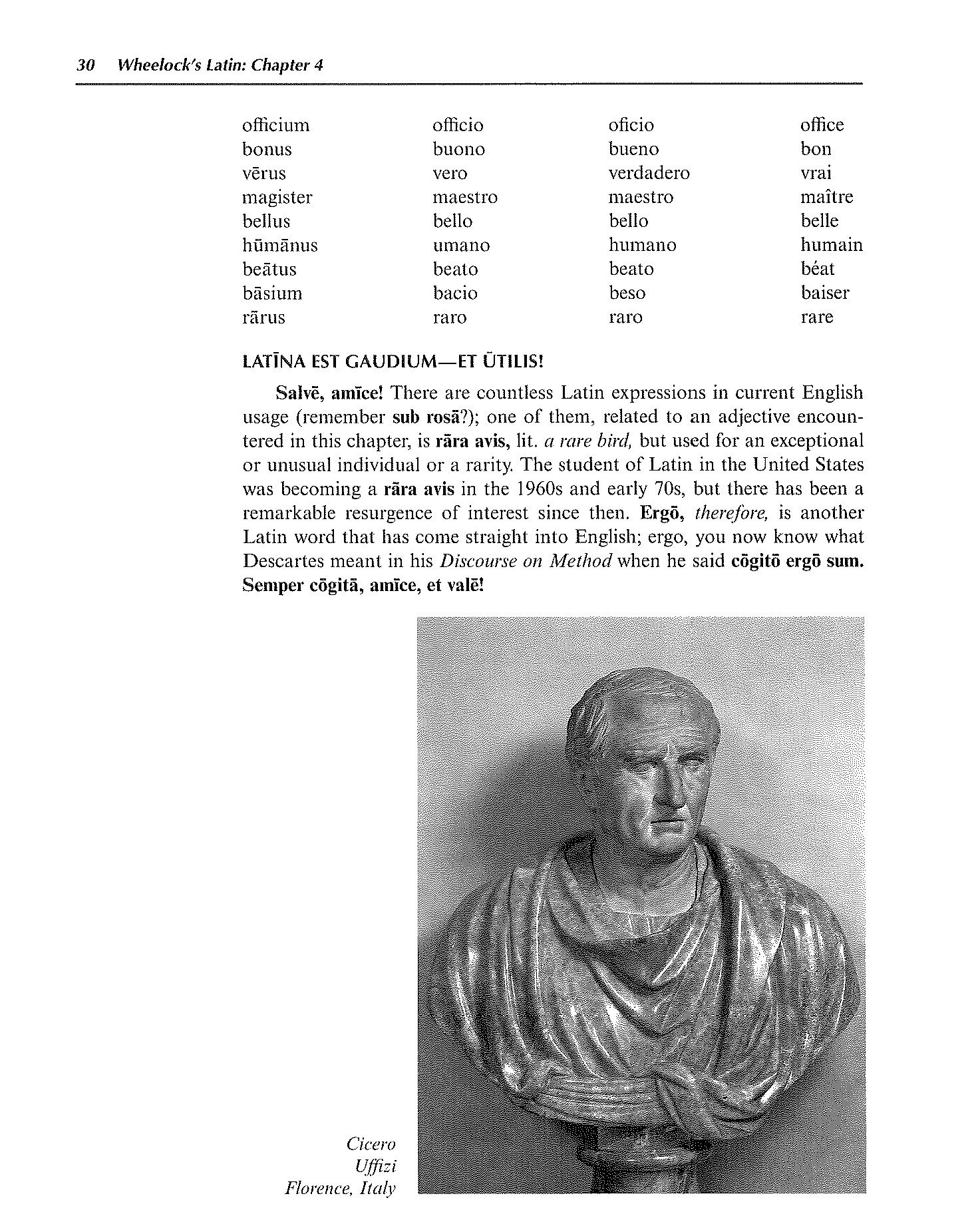
page_listing.tpl
page_subListingDetails.tpl
sub_listingDetails_style1.tpl
sub_listingDetails.title.tpl
ergō therefore
ergō is a Latin Adverb that primarily means therefore.
Definitions for ergō
Wheelock's Latin
Adverb
- 1
therefore
Oxford Latin Dictionary
Preposition
- 1
On account of, for the sake of, in consequence of, etc.
Particle
- 1
(introducing a resultant event, state of affairs, etc.) For that reason, therefore, then, so, accordingly, etc.
- 2
(in questions) In that case, then.
- 3
(in dialogue, with consequential force reduced or even app. absent): All right then, well then; (esp., used to introduce a question arising from a previous speaker's remark, often an answer to an earlier question) yes, but.
- 4
(elliptically, with suppression of the preceding statement, introducing an exclamation or rhetorical question, often with a note of emotion) So it seems that . . ! is it then true that . . ?
- 5
(transitional) Accordingly, well then, well now.
Sentences with ergō
Latin to English
Cōgitō ergō sum.Compare I think therefore I am.
Mundus vult decipi, ergo decipiatur.Compare The world wants to be deceived, so let it be deceived.
Noenum rumores ponebat ante salutem; ergo postque magisque viri nunc gloria claret.Compare He never put rumors before our safety; and so today his glory shines the brighter.
Ergo sollicitae tu causa, pecunia, vitae; per ter immaturum mortis adimus iter; tu vitiis hominum crudelis pabula praebes; semina curarum de capita orte tuo.Compare So it is you, money, the cause of a restless life. Because of you we embark toward early death; on you men's vices cruelly feed, you, the seed and fountainhead of all our cares.
Ergo vivida vis animi pervicit, et extra processit longe flammantia moenia mundi atque omne immensum peragravit mente animoque.Compare Therefore the lively power of his mind prevailed, and forth he marched far beyond the flaming walls of the heavens, as he traversed the immeasurable universe in thought and imagination.
Data sources
Notes
- Definitions
- Frederick M. Wheelock, Wheelock's Latin, 6th ed., rev. Richard A. LaFleur (New York, NY: HarperCollins Publishers, 2005): 30.
- P. G. W. Glare, Oxford Latin Dictionary, Vols. 1-8 (Oxford: Clarendon Press, 1982): 616.
- Word frequencies
- Christopher Francese, "Latin Core Vocabulary," Dickinson College Commentaries, last modified 2014, http://dcc.dickinson.edu.
- Paul B. Diederich, The Frequency of Latin Words and Their Endings, PhD diss., (Columbia University, 1939).
- Louis Delatte, Suzanne Govaerts, Joseph Denooz, and Etienne Evrard, Dictionnaire fréquentiel et index inverse de la langue latine [Frequency Dictionary and Inverse Index of the Latin Language] (Liège, Belgium: Laboratoire d'analyse statistique des langues anciennes de l'Université de Liège [L.A.S.L.A.], 1981): 119.
Bibliography
Allen, Joseph H. Allen and Greenough's New Latin Grammar for Schools and Colleges: Founded on Comparative Grammar. Edited by James B. Greenough, George L. Kittredge, Albert A. Howard, and Benjamin L. D'Ooge. Boston, MA: Ginn & Company, 1903.
Crystal, David. A Dictionary of Linguistics and Phonetics. 6th ed. Oxford, UK: Blackwell Publishing, 2008.
Delatte, Louis, Suzanne Govaerts, Joseph Denooz, and Etienne Evrard. Dictionnaire fréquentiel et index inverse de la langue latine [Frequency Dictionary and Inverse Index of the Latin Language]. Liège, Belgium: Laboratoire d'analyse statistique des langues anciennes de l'Université de Liège (L.A.S.L.A.), 1981.
Diederich, Paul B. The Frequency of Latin Words and Their Endings. PhD diss., Columbia University, 1939.
Francese, Christopher. "Latin Core Vocabulary." Dickinson College Commentaries. Last modified 2014. http://dcc.dickinson.edu/latin-vocabulary-list.
Gildersleeve, Basil L., and Gonzales Lodge. Gildersleeve's Latin Grammar: Third Edition, Revised, and Enlarged. 3rd ed. London, England: Macmillan and Co., 1903.
Glare, Peter G.W. Oxford Latin Dictionary. Vols. 1-8. Oxford, England: Clarendon Press, 1982.
Krüger, Bernd. "Latin Conjugation Tables." Cactus2000. Accessed May 5, 2023. https://latin.cactus2000.de/index.en.php.
Pierson, Nick. "Sound of Text." Accessed October 26, 2019. https://soundoftext.com.
Wheelock, Frederick M. Wheelock's Latin. 6th ed. Revised by Richard A. LaFleur. New York, NY: HarperCollins Publishers, 2005.
Wiktionary Contributors. "Victionarium." Wikimedia Foundation, Inc. Updated March 18, 2019. https://la.wiktionary.org/wiki/Victionarium:Pagina_prima.
Citation
Chicago (17th ed.)
Allo Contributors. "ergō (adv.) - Latin Word Definition." Allo Latin Dictionary. Last modified . Accessed February 19, 2026. http://ancientlanguages.org/latin/dictionary/ergo.
Entry created on . Last updated on .







